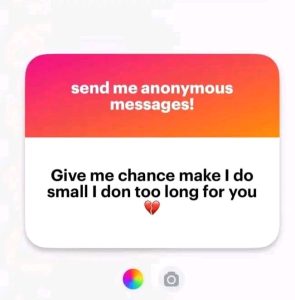By Habibullah Temako

“Aliya ehen tell us why you have a deep voice and a strong face like a man!”—these are the words that are still ringing bells in the ears of Jimoh Aliyah*, a 200-level student of Usmanu Danfodiyo University, Sokoto (UDUS), after an unknown user forwarded a WhatsApp direct message which was used to describe her voice through anonymous messages.
At the age of 22, Aliyat’s world broke down to felony after those hurtful words. Her eyes, which always look bright with hope, now swell up with tears at the mere reflection of the verbal assault she endured.
The anonymous message, laced with bitter words had not only inflicted pain on Aliya’s soul but also triggered a torrent of emotional distress that she could not endure alone. She felt dejected—cried her eyes out—and struggled to embrace the true being of herself ever again.
“I received abusive messages that night and it was as if I had a fight with someone,” she said with a chronic sense of dissatisfaction. “And the one that really hurt me is when the person wrote anonymously that!”
Those words, Aliyat continued, pierced through her soul so much it turned to a nightmare. Her depression lingered for nearly a month and she appeared visibly troubled with self-loathe. Aliyat’s trauma extended beyond mental imbalance, she also felt disinclined to study or even read against the semester exams.
“I can’t really describe how much I felt crushed about that message because of how overwhelmed I was with depression, which has made me hate myself. In fact at that time, I lost focus and also struggled to read throughout that semester.”

Aliyat recounted that it took the intervention of her roommate who comforted her to disband her mind from the negative thoughts of those felonious statements before she could overcome the trauma. According to her, it took a daily consort before the wound could heal.
The introduction of technology was hailed with numerous advantages it brought, with social media becoming an integral means of communication among people over the world. Yet, the usage of technology was also accompanied with its great evil, as the same social media has turned into a handful platform that promotes cyberbullying, cyber stalking and defamation.

Cyberbullying—one of the topical practices among social media users, refers to the use of technology to harass, hurt, embarrass, humiliate, and intimidate people online. It takes the form of bullying, including being intractable, recurring, causing harm perceived by the target. These actions are perpetrated via computers, mobile phones, or other electronic devices.
According to a journal published by Research Gate, there are 3.5 billion internet users worldwide and more than 108 million people are repeatedly using the internet in Nigeria as of 2022. Between 20 and 40 percent of Nigeria youths are predicted to have experienced cyberbullying at some point in their lives.
The journal further revealed that 52% of the users are women who were victims of cyberbullying on Tiktok. 40% of them suffered their predicament on Whatsapp, with Facebook accounting for another 40%, while Twitter and Instagram covered 26% and 24% respectively. 35.9% of the victims perceived cyberbullying perpetrators as friends, 25% as anonymous, 23.4% as an ex-lover, and 15.7% as a classmate, the research added.
Similarly, the International Center for Investigative Reporting (ICIR), a reputable media organization in Nigeria also reported that one in six young people across 44 countries said they were victims of online bullying in 2022, with a slightly higher percentage among girls.
More Tales, More Wails
Aliyat is not alone. Her experience mirrored the growing concern posed by the uncontrollable usage of social media. Rotimi Gloria*, a 200-level Linguistic student, was another UDUS student victimised through anonymous messages. She narrated how her experience was fatally injurious when she was tagged as the most ugly girl in their department during the first semester of the ongoing academic session.
As extremely contemptuous as that could sound, Gloria’s mood immediately swung to a growing surge of suicidal feelings, as she became sick by the derogatory remarks on her natural appearance. “I feel the insultive remarks deep inside me that it hurts me so badly anytime I remember about it.”
Gloria also recounted that was not the first time she would be victimized through cyberbullying, as she had previously been attacked, harassed and humiliated on social media with the usage of anonymous messages.
“I think those messages come from those who just dislike me for no reason. Since they cannot tell me physically, they use social media to shame and embarrass me with hurtful messages.”
Most of these remarks, she further expressed, started with casual jokes and catching cruise online. But it later turned to a medium through which people freely express their grudges and sentiment towards people they dislike out of personal hatred.
Recurrent Body-Shaming, Harassment
For Kudirat Ajibola, a 400-Level student studying Applied Chemistry at UDUS, she is still suffering from the incarceration of the sexually provocative words that flooded her WhatsApp inbox when she was abused through anonymous messages. She expressed to Digest Press that she felt exposed and vulnerable after those words were communicated to her.
“I stopped engaging in anonymous messages when I found out that it was a ridiculous form of conversation that people use to say dirty things about others. It’s very uncultured, irritating and disgracing.”
“For instance, I remembered how most of my contacts would send me messages anonymously asking questions like, ulhm, I’m looking for a beautiful chat mate like you. Can you be my girlfriend? Or statements like: you’re my biggest crush, and the rest.”
She also explained that the far-reaching effects of such irritating messages have the tendency of exposing victims to sexual abuse, claiming that ladies mostly targeted, harassed and embarrassed through the channel.
To wit; a research revealed that fresh students, particularly females, were identified as the most vulnerable groups of this disturbing menace. Cyberbullying was found to have a profound impact on victims’ mental health, with anxiety, depression, and low self-esteem being common psychological effects. It also negatively affects academic performance, as victims experience a decline in focus and participation.
A Case Too Many
Adetoro Juliet, a 100-Level Public Administration student of Kwara State Polytechnic, could barely handle the psychological frustration that was accompanied with body-shamed after she was subjected to abuse through anonymous messages.
Juliet underwent a tough moment of rigor, overwhelmed with shame. She said the experience had shattered her confidence and self-respect because she felt both the internal and external damage it caused to her.
“Although I posted the anonymous message link on my WhatsApp status, expecting some flattery remarks from my contact friends. I instantly received three insultive messages, clowning me that I look chubby and obese like someone who has given birth to four children.”
“As if that wasn’t enough, another message also came with a more provocative remark stating that all fat ladies engage in hook-ups in order to grow breasts and buttock.”
Juliet recounted how the sound of those embarrassing words forced her to feel dejected to look at herself in the mirror, stating that the experience made her lose her mind completely.
“Only God knows how much I felt depressed because of those hurtful words and even till now I’m still shuddering in pain. I could not take my semester exams because I was hospitalised over these remarks.”
Tejumola Zarah*, a 200-level Mass Communication student at Kwara State University, Malete (KWASU), also shared a similar ordeal like Juliet.
She narrated how she was victimised twice and even went to report the issue to the school management when she could no longer bear the pain.
Stating with distress, she said that she was harassed by someone who anonymously wrote her disturbing provocative messages. According to her, she was both molested, abused and humiliated by her bullies.
“It’s very bad with the way some people engage with others through anonymous messages. I was affected for some time, when someone anonymously sent me a dirty chat asking me out in a sexually provocative manner,” she lamented.
Anonymous Bullying: An Indiscriminate Case Irrespective of Gender
Solihu Ibrohim*, a 300-Level English student of UDUS, was ravaged by body-shaming messages from anonymous cyber bullies. He said that the experience troubled him so much that he suffered a serious depressive disorder resulting from the abusive message.
Ibrohim recalled that the memory still bruises him when whispered barely above his voice during an interview with this reporter. The whole saga started after Ibrohim’s classmate created an anonymous message link and shared it to their department group.
“As if everyone is waiting, many hurtful messages started dropping in the group with my name being dragged through the mud. I was insulted so many times,” he said.
“But the most abusive statement that cut me deeper than the rest, was being called “doubly fat” like poultry, thereby mocking that I always found sweating in class like a hungry prisoner,” he paused.
Similarly, Taofeek Muftau, a 300-Level Forestry student of UDUS, shared a distressing similar ordeal regarding body-shaming, saying remembering the experience was like a punch to the gum for him. Taofeek recounted, as his voice laced with emotion “I did not know my coursemates would mock me because of how I walked until I saw the insultive message tagging me as k-leg swagger in the class.”
Those anonymous hurtful messages later translated into what Taofeek described as a “cruel joke” among his coursemates, as he frequently referred to, using those unpleasant remarks.
Cyberbullying: A Criminal Offence in Nigeria
The usage of social media to convey hurtful messages was prohibited, and regarded as a punishable offence under the Nigeria legal system. This was addressed by the Nigerian Cybercrime (Prohibition, Prevention, etc.) Act of 2015. The Act incriminates cyberbullying and its kindred acts such as cyberstalking, cybersquatting, and cyberterrorism.
Section 24 of the Act criminalizes the sending of grossly offensive, pornographic, indecent, obscene, or menacing communication through computer systems ог networks. This provision can be linked to cyberbullying when the content of the messages used falls under these categories.
The section also prohibits the intentional transmission of false information about another person to cause annoyance, harm, or anxiety.
Furthermore, the section makes it an offence to transmit communications that bully, threaten, or harass another person, causing them to fear death, violence, or bodily harm.
For example, on 2 August 2023, the Federal High Court, Lagos State, sentenced a TikToker, Okoye Blessing to an imprisonment of three years, or a fine of one hundred and fifty thousand naira, for her actions of posting offensive and defamatory content, spreading false information about a celebrity actress named Eniola Badmus while threatening her through various social media platforms.
Also, a blogger was arrested for cyberstalking the former minister of works, Babatunde Raji Fashola. He allegedly posted false information about Fashola’s involvement in the drafting of a controversial verdict in the Presidential Election Petition Trial, and that the military had been sent to Fashola’s house, thereby allegedly intending to cast aspersions on the former minister.
This act was condemned by the police as a crime committed under Section 24 of the Cybercrime Act 2024.
